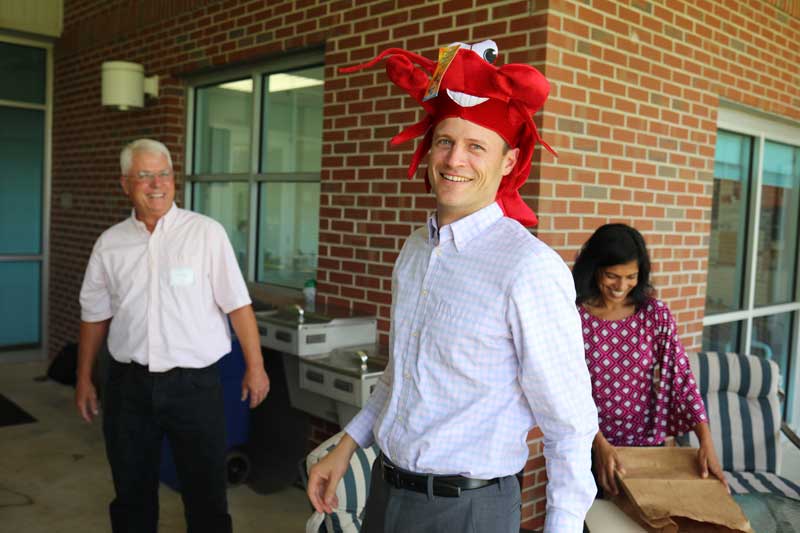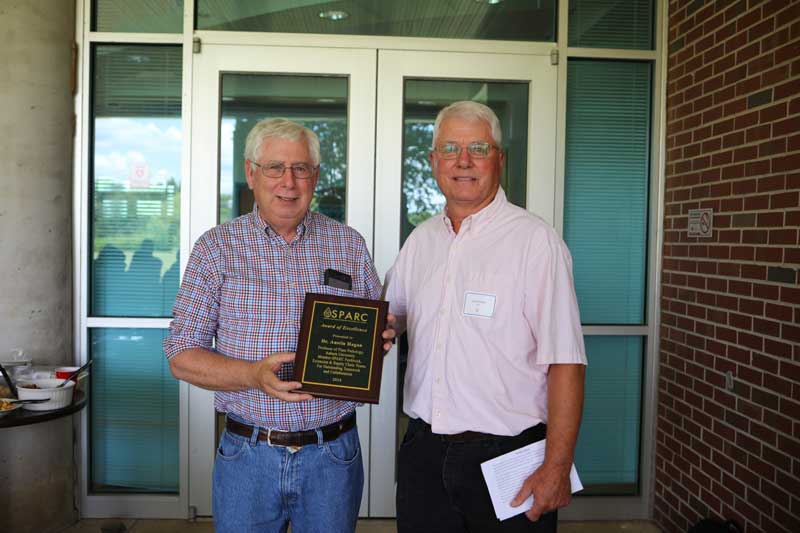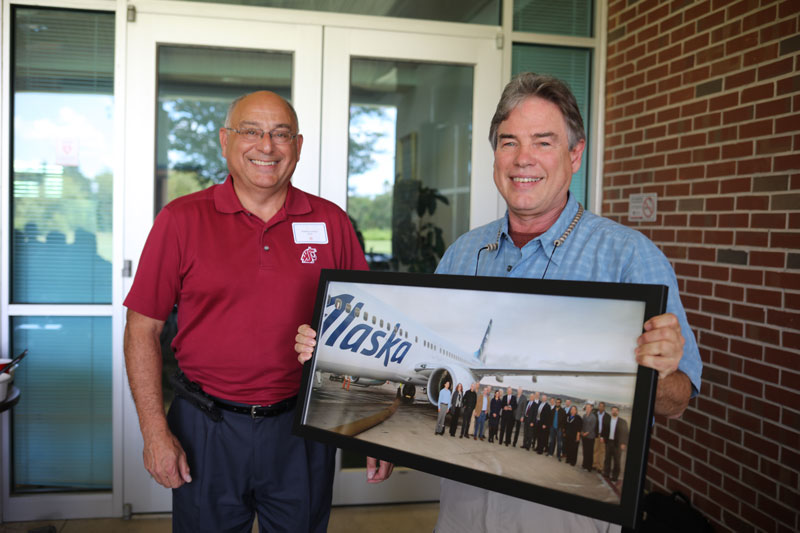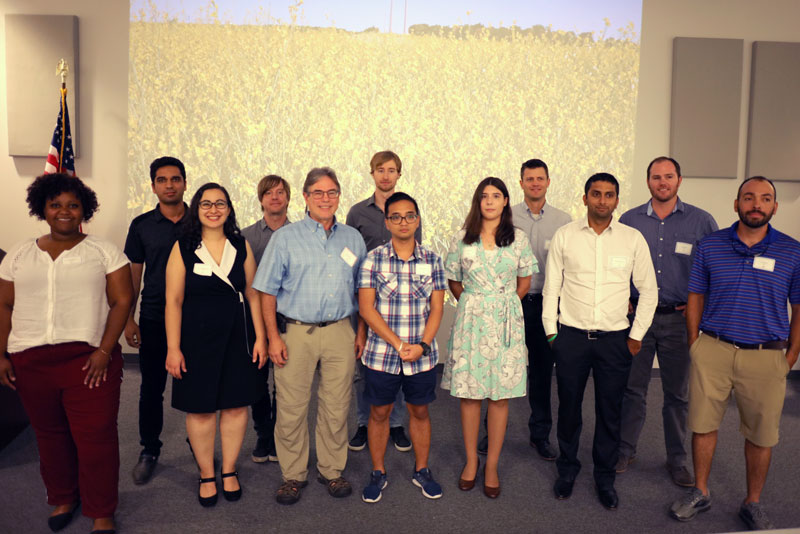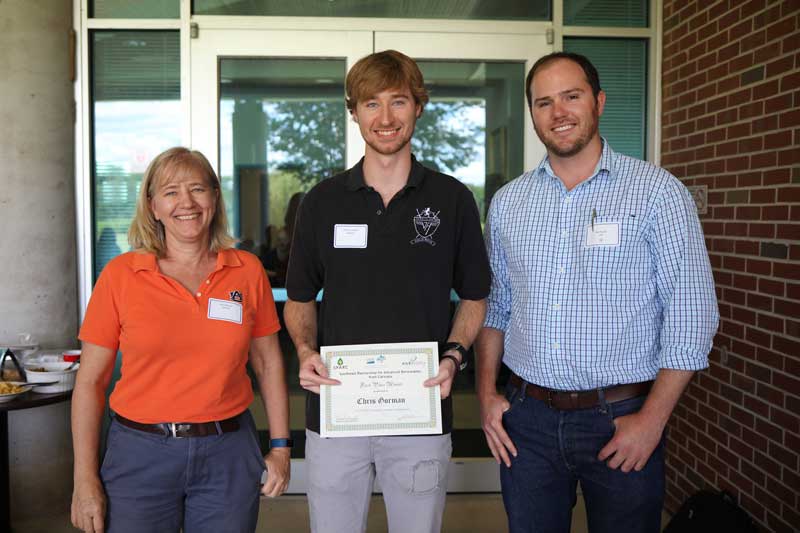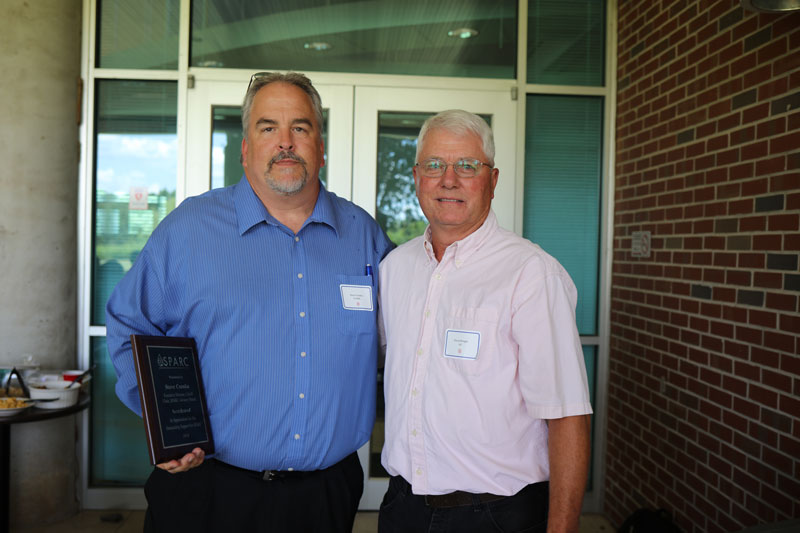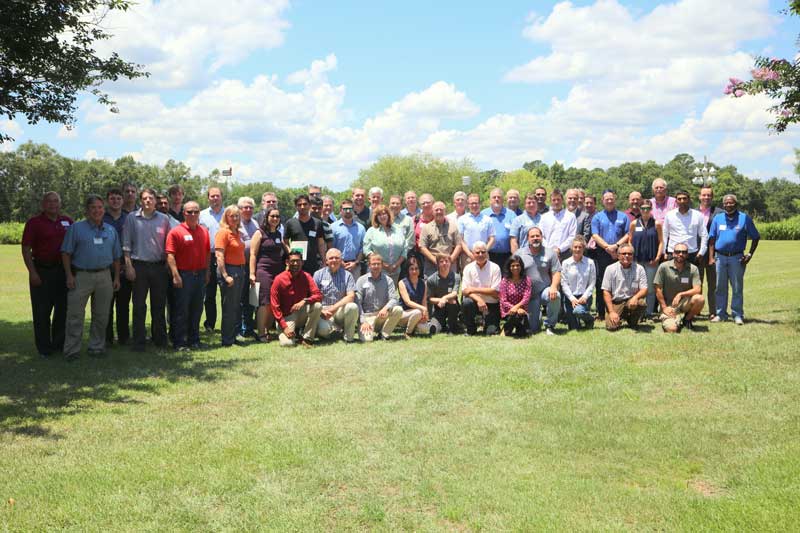
Message from the Executive Committee
It has been one month since our first SPARC annual meeting and we are well into year two of our project. Thank you to everyone that participated in the meeting. The meeting was a good opportunity to welcome new members to the SPARC team and to take stock of our progress to date as well as critically discuss our goals moving forward. Hopefully many fruitful discussions were had by all and new ideas shared.
A few messages that stood out were Steve Csonka’s message reiterating the scale of the opportunity for SPARC to contribute to the development of renewable bio-based products to meet a strong aviation jet fuel market. Dewey Lee motivated us to meet this challenge by encouraging each of us to think big/critically about the approaches we take and solutions we develop. In the examples Dewey shared about farmers striving for world record breaking yields I think there was a common theme that a strong incentive (a world record) and clear metric (yield per unit area) can motivate people to generate creative approaches to meet their goals.
One key factor that will determine our success will be open communication. We must conduct regular reality checks to critically evaluate our progress and allow open discussion around potential directions to take. For our team to be successful we must cooperate! It was apparent that many team members are reliant on other individuals and groups to provide the necessary inputs (data) for them to successfully accomplish their work. We will be working with these folks to help communicate their needs and establishing plans to ensure that all contributions are appropriately acknowledged.
We left the annual meeting with a report card and some homework. Our report card was in the form of Ben Christ’s evaluations – the results of these evaluations are guiding our efforts to improve the project and overall SPARC team. Our homework was to define next steps toward our goals, establish roles and responsibilities and for output.
As we move forward into the second year of this project we hope that you are as motivated and excited as we are about the progress that has been made. We look forward to another productive year as we strive toward the expansion of carinata in the Southeast US and continue our efforts toward supply chain development.
SPARC Stories
Looking Back and Ahead
It has officially been a year since SPARC took off but when did SPARC really begin? Was it when the US Department of Agricultures’ National Institute of Food and Agriculture (NIFA) made the official announcement back in September of 2017, or was it when Steve Miller at the UF Department of Chemistry hosted a conference call back in May 2016 to see if there was any interest in responding to NIFA’s call for proposals, or was it way back in 2010 when Ed Coppola of Applied research Associates (ARA) Inc. suggested carinata as a winter crop for biofuels to David Wright, and David asked, “What is Carinata”. I want to say SPARC was conceived when that question was asked. From what began as modest trials with a couple of carinata lines in Quincy, FL, this project has grown into a full blown public-private undertaking aiming to establish a carinata bioeconomy in the Southeast US. This scale could not be achieved without a promising product, an active pursuit of research funding, subject matter experts, and private industry that worked closely with academia to extend this new opportunity to the stakeholders in the region.
A solid body of knowledge was developed by early funding and cost sharing from the UF dean’s office, Florida Department of Agriculture and Consumer Services, Agrisoma Biosciences Inc., and ARA. Agronomists, crop physiologists, weed specialists, nutrient specialists, plant pathologists, and others collectively contributed to developing production guidelines for the early adopters (producers) in the region. Meanwhile test flights using carinata oil for drop-in fuel were successfully completed underscoring the promise that the product and associated technology held. What we were looking at was a winter crop that could be produced on unutilized fallow lands to meet market demands for drop-in jet fuel, animal protein, valuable coproducts that are not fossil-fuel based, while bringing that extra off-season income to the producer and downstream processors.
SPARC stands on this solid promise and aims to make what we have, bigger and better. Essentially what SPARC has set out to do is to create a toolbox for success for every stakeholder in the carinata enterprise. This includes a producer trying to make best yields on the crop, to handlers and warehouse owners to transportation businesses, fuel manufacturers, technology licensors and licensees, investors, regulating agencies, policy makers in state and federal government, the workforce engaged in this enterprise, commercial and military aviation, animal and feed producers , the general public and so on. What works for one may not work for the other but as we dig deep and we learn more we are confident we can make it a win-win for all. That’s the reason we have the experts on our side- over 70 individuals with great track records in research, extension and education, experts from the industry that have their hand on the pulse of the market, and an eminent advisory board steering the team to stay on track.
Realizing that sustainable and cost-effective feedstock generation is central to establishing a resilient supply chain in the region, SPARC has its work cut out for itself for the next few years. SPARC’s resolve is to make the carinata supply chain resilient to uncertainties and extremes-be it weather or the marketplace. A strong commitment and monetary investment from Agrisoma toward continuous development of new genetics geared to succeed in the Southeast is integral to that resolve. Adding to that is a commitment to sustainability as it pertains to protecting and enhancing our natural resources as well as economic viability. That commitment has our team looking at ways to optimize the supply chain in a way that least impacts the environment on one hand and profitability on the other. Alleviating risk to the producer and all the stakeholders downstream to the farmgate continues to be important to the SPARC mission.
Integrating precision agriculture strategies has emerged as a top priority to precisely manage water, nutrients and other inputs taking into account within field variability. Collecting extensive data documenting input, output and effect on natural resources (soil, water, air) to perform a comprehensive life cycle analysis will be important as a comparative metric for carinata. A techno-economic analysis of the feedstock and technology in its current state will be our immediate priority to inform and direct SPARC activities, as well as provide insight to industry, end users and all stakeholders alike regarding investment strategies, policy modification and near and long term targets.
SPARC Member Spotlight
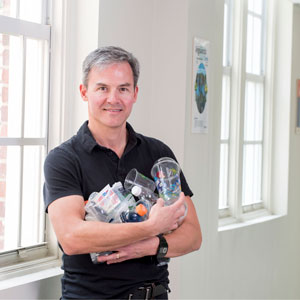 Stephen Miller
Stephen Miller
Stephen Miller joined the University of Florida (UF), Department Of Chemistry in 2007 as an Associate Professor in the esteemed Butler Polymer Program. Prior to 2007, Prof. Miller earned B.S. and M.S. Degrees in Chemistry from Stanford University, earned a Ph.D. in Chemistry from Caltech, completed a postdoctoral fellowship at M.I.T., and spent six years as an Assistant Professor in the Chemistry Department at Texas A&M University. The overarching goal of his research program is the design, synthesis, and characterization of new biogenic polymers with the potential to replace incumbent packaging plastics, which are generally fossil fuel-based polymers with slow degradation behaviors.
During his time at UF, Dr. Miller has excelled in research and teaching. He has given well over 100 presentations, including invited talks in seventeen countries on five continents. He has published about 65 highly cited papers and is an inventor on eight U.S. Patents. His high impact research has brought him funding from multiple agencies including the NSF, and several national and international awards and accolades. Testimonies from his students are proof of the outstanding teaching and mentoring capabilities of Dr. Miller.
Dr. Miller is a member of the meal and coproducts team of SPARC and has major accomplishments and breakthroughs under his belt in the short time since the project has started. He and his students were able to identify valuable coproducts from carinata meal that have various industrial applications. His commitment to sustainable and environmentally friendly polymers is evident not only in his research undertakings but also in his successful business ventures, “US Bioplastics” and “Florida Sustainables”.
Dr. Miller was born and raised in Muncie, Indiana. He lives in Gainesville, Florida with his wife, two boys, a cat and a dog. He is an avid sports fan and especially enjoys watching all UF sports including football, basketball, baseball, softball, gymnastics, and volleyball.
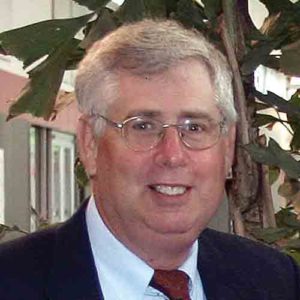 Austin Hagan
Austin Hagan
Austin Hagan is Professor and Extension Plant Pathologist at Auburn University’s Department of Entomology and Plant Pathology as well as ACES Crops Team Leader. He has a long standing career with Auburn University where he started in 1980 as an extension plant pathologist. Dr. Hagan works extensively in all row crop systems including corn, cotton, peanut, sorghum as well as biofuel crops and amenity crops. His research focuses on disease and nematode management and implementing integrated pest management strategies in crops. He conducts several field trials at multiple locations and works collaboratively with allied disciplines to identify holistic disease management solutions. He has authored and co-authored several journal and technical articles, extension publications and presented numerous talks at research and extension meetings.
Dr. Hagan is a member of the feedstock, extension and supply chain teams within SPARC. Austin has been involved in carinata research for over two years. He is leading and co-leading various studies identifying disease resistant carinata varieties, developing a fungicide regimen and disease management strategies for carinata. He has actively sought funding for furthering carinata research, extension and education in the region. Within SPARC he has been an enthusiastic member of the extension and supply chain teams in addition to the feedstock team. As part of his outreach activities he has given several talks to extension professionals and growers during various events including the minority farmer’s conference at Tuskegee, AL. He has been instrumental in helping the supply chain team establish key connections within important state agencies such as the AL Department of Economic and Community Affairs and AL Dept. of Ag and Industries. For his outstanding contributions to SPARC, Dr. Hagan was awarded the SPARC Award of Excellence at the recently concluded SPARC Annual Meeting. Congratulations Dr. Hagan!
Dr. Hagan resides in Opelika, AL with his wife Susan, and enjoys fishing, boating and visits to the Florida Gulf beaches.
Graduate Student Spotlight
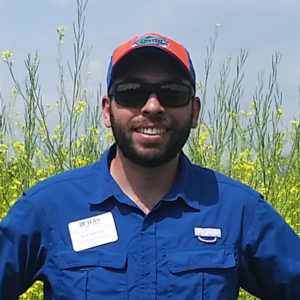 Ted Stansly
Ted Stansly
Ted is a graduate student at the University of Florida in Dr. David Wright’s program, currently pursuing a PhD in Agronomy. He has BS and MS degrees in Horticultural sciences from University of Florida. Prior to obtaining formal graduate degrees Ted was involved in a variety of projects related to natural resource management and pest management. Ted has participated in several projects related to technique development and refinement for root knot nematode rearing and other laboratory procedures. Ted brings a systems level approach to his PhD research due to his past research experiences. His research approach includes both greenhouse and field based studies to answer pertinent questions in understanding how carinata can fit into existing cropping systems.
His dissertation will focus on glucosinolates in carinata and how they are influenced by sulfur nutrition. He is also investigating how best to use glucosinolates in carinata to control nematodes and other pests in crops that follow carinata in a cropping system. His research is integral to advancing carinata production within sustainable cropping systems in the southeastern United States.
Ted enjoys kayak fishing, camping, mountain hiking in Colorado, and other outdoor adventures. He is an avid traveler and loves meeting new people and trying out new cuisines. He aspires to join the private sector after attaining his PhD. Ted was runner up of the graduate student competition at the recently concluded SPARC Annual Meeting held at Quincy, FL. Congratulations, Ted!
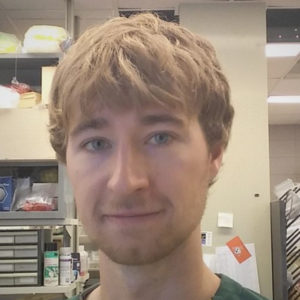 Chris Gorman
Chris Gorman
Chris is a graduate student at Auburn University in Dr. Kira Bowen’s program, currently pursuing a Master’s degree in Plant Pathology. He has a BS degree in Botany from Orgeon State University. Prior to pursuing graduate studies Chris gained research experience with the Fall Creek Farm and Nursery, an international blueberry wholesaler. He was involved in research related to growth optimization of blueberry varieties in vitro. Chris also had a long stint at the USDA-ARS facility in Corvallis, OR, developing integrated pest management strategies for small fruit crops, field crops and hops.
Chris’ project in SPARC is related to the epidemiology of Sclerotinia stem rot on southeastern grown Brassica carinata. Understanding the occurrence and spread of this disease will help mitigate stem rot related risk in carinata production in the Southeast. He continues to make tremendous progress in his research.
Chris is an avid hiker and backpacker and especially loves to visit all the national parks. He has hiked through a dozen parks so far with many more on his list. He has been to several US States and Canada on snowboarding trips. Chris was the first place winner of the graduate student competition at the recently concluded SPARC Annual Meeting held at Quincy, FL. Congratulations Chris!
Events
SPARC Annual Meeting was held in Quincy, FL on June 25-26, 2018. The meeting was well attended by SPARC members, advisory board, industry partners and special invitees. Dr. Ralph Cavalieri, Project Director of USDA-NIFA funded NARA project gave a special talk on Dynamics of multi-disciplinary collaborations and public-private partnerships. Glenn Johnston, VP Regulatory Affairs at Agrisoma Biosciences Inc. laid out Agrisoma’s priorities in light of current industry and policy mandates. Several break-out sessions of all SPARC workstreams, executive committee, steering committee and the advisory board allowed for targeted discussions and opportunity to strategize for year 2.
One of the main highlights of the meeting was the Graduate Student Presentation Competition. There was enthusiastic participation from eight SPARC graduate students: Jessica Baldwin, Mahesh Bashyal, Jacenta Hinton, Omid Karami, Ted Stansly, Chris Gorman, Luiza Brabo-Catala, and Nguyen Thinh. First place winner and runner up walked away with a cash prize of $200 and $50 respectively.
Upcoming events
Agrisoma Grower Events-Open event with food, live music and fun!
July 28; 7:00 to 10:00 PM-Ike Hamilton Expo Center, 501 Mane ST., West Monroe, LA
August 11; 7:00 to 10:00 PM-Cullman Co. Ag and Trade Center, 17645 US Hwy 31, Cullman, AL
August 24; 8:00 to 11:00 PM-Southern Middle Tennessee Pavilion, Joyce Ln, Winchester, TN
September 22; 4:00 to 11:00 PM-Northwest GA Amphitheater, 200 Catoosa Cir, Ringgold, GA
Producer Meetings organized by Agrisoma (RSVP to Christine Bliss 850-559-7118)
July 31; 7:00 to 8:30 PM-Sumpter Co. Extension Office, Americus, GA
August 1; 8:00 to 9:00 AM-Arabi Feed & Grain, Arabi, GA
August 1; 1:00 to 2:30 PM-Coffee Co. Extension Office, New Brockton, AL
August 7; 1:00 to 2:30 PM-Morgan Co. Extension Office, Madison, GA
August 8; 10:00-11:30 AM-Dawson, GA
August 9; 12:00 to 3:00 PM-Carinata production meeting: Brooks Co. Ag Bldg., 400 East Courtland Ave. Quitman, GA


